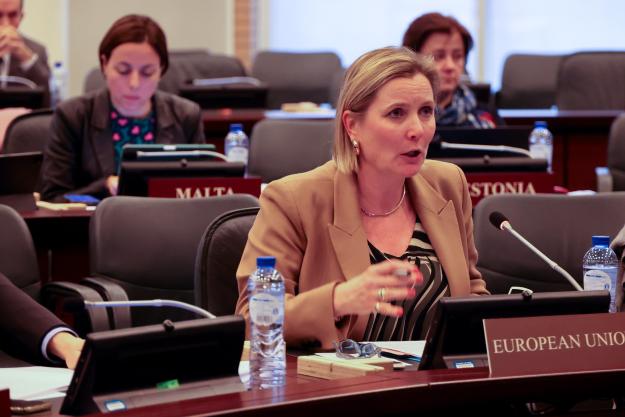The Director-General of the Organisation for the Prohibition of Chemical Weapons (OPCW), Ambassador Fernando Arias, delivered a briefing on the work of the OPCW to members of the European Union (EU) Political and Security Committee at the OPCW's headquarters in The Hague.
In his briefing, the Director-General highlighted that: "The OPCW and the EU should collaborate with relevant stakeholders to forge a more secure world. This is especially important in the current political climate, when the international community is facing multiple challenges to address effectively the threats of weapons of mass destruction, including chemical weapons."
The Director-General gave updates on the progress of the OPCW Centre for Chemistry and Technology (ChemTech Centre) project: "The Organisation must keep pace with the progress in science and technology and the way it can impact the Convention. Our new ChemTech Centre will play an essential role in ensuring the OPCW can keep up with the exponential growth in scientific knowledge and technological instruments."
"We especially appreciate the direct and consistent support of the EU and its Member States to the OPCW since its establishment in 1997, both politically and financially," the Director-General added.
"We commend the successful work of the Director-General and the OPCW Technical Secretariat staff in implementing the Chemical Weapons Convention and the tasks assigned by the States Parties," said Ambassador Delphine Pronk, Chair of the EU Political and Security Committee. "Discharging its duties with professionalism, expertise, integrity and independence, the OPCW has the full trust of its Member States."
"We also applaud the OPCW's important contribution to addressing impunity for the use of chemical weapons through the reporting of its Investigation and Identification Team. The EU reiterates its full support to the OPCW in addressing future challenges," she added.
On 27 January, the third report of the IIT was published.

Ambassador Delphine Pronk, Chair of the Political and Security Committee
Background
The European Union Political and Security Committee is responsible for the EU's Common Foreign and Security Policy and the Common Security and Defence Policy. It monitors the international situation; recommends strategic approaches and policy options to the Council; provides guidance to the Military Committee, the Politico-Military Group and the Committee for Civilian Aspects of Crisis Management; and ensures political control and strategic direction of crisis management operations.
Taken together, the EU and its Member States are the largest voluntary contributors to the OPCW's work.
As the implementing body for the CWC, the OPCW, with its 193 Member States, oversees the global endeavour to permanently eliminate chemical weapons. Since the Convention's entry into force in 1997, it is the most successful disarmament treaty eliminating an entire class of weapons of mass destruction.
Over 99% of all declared chemical weapon stockpiles have been destroyed under OPCW verification. For its extensive efforts in eliminating chemical weapons, the OPCW received the 2013 Nobel Peace Prize.






